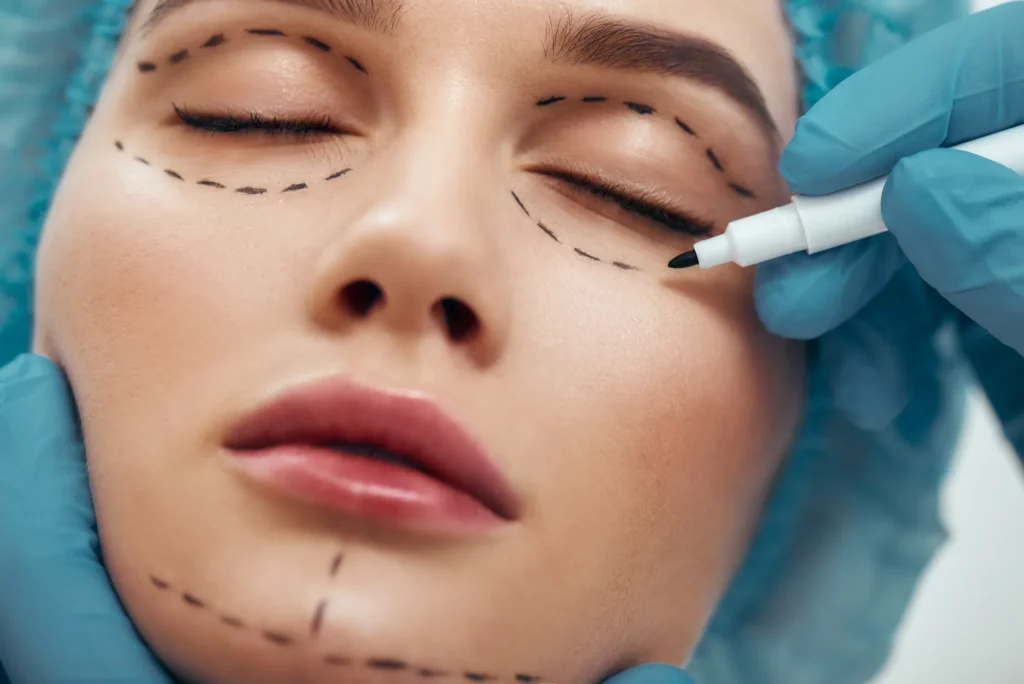Preoperative preparation for facial aesthetics will depend on the specific procedure that will be performed. However, here are some general guidelines that may be helpful:
Consultation with a qualified and experienced cosmetic surgeon or dermatologist: Before any facial aesthetic procedure, it is important to consult with a qualified and experienced cosmetic surgeon or dermatologist to discuss your goals, expectations, and any concerns you may have. This will allow you to make an informed decision about the procedure and ensure that you are a good candidate for it.
- Medical evaluation: Your surgeon or dermatologist may require a medical evaluation to determine if you are healthy enough for the procedure. This may include a physical examination, blood tests, and other diagnostic tests.
- Medications and supplements: You should inform your surgeon or dermatologist about any medications or supplements you are currently taking, as they may interfere with the procedure or the healing process. Some medications and supplements may need to be stopped before the procedure.
- Smoking and alcohol: Smoking and alcohol consumption can impair healing and increase the risk of complications. It is recommended that you stop smoking and limit your alcohol intake before and after the procedure.
- Sun exposure: It is important to avoid sun exposure before the procedure, as this can increase the risk of complications and interfere with the healing process. You should also use sunscreen and wear protective clothing after the procedure to protect your skin.
- Follow preoperative instructions: Your surgeon or dermatologist will provide you with specific preoperative instructions, such as when to stop eating and drinking before the procedure, and what to bring with you to the procedure.
By following these guidelines, you can help ensure that your facial aesthetic procedure is safe and successful, and that you achieve the desired results.
Postoperative care for facial aesthetics is crucial for a successful recovery and to achieve optimal results. Here are some general guidelines that may be helpful:
- Follow your surgeon’s instructions: Your surgeon or dermatologist will provide you with specific postoperative instructions, such as how to care for the incision sites, how to manage pain and discomfort, and when to resume normal activities. It is important to follow these instructions closely to ensure a smooth and speedy recovery.
- Manage pain and discomfort: Your surgeon may prescribe pain medication or recommend over-the-counter pain relievers to manage any discomfort you may experience after the procedure. You may also apply ice packs to the affected area to reduce swelling and bruising.
- Protect the incision sites: It is important to avoid touching or rubbing the incision sites, and to keep them clean and dry. Your surgeon may provide you with specific instructions on how to clean the incision sites and what type of dressings to use.
- Avoid strenuous activities: You should avoid any strenuous activities that may increase your heart rate or blood pressure for at least a week after the procedure. Your surgeon may recommend that you refrain from exercise and other physical activities for a longer period of time.
- Follow a healthy diet: Eating a healthy and balanced diet can help support your recovery and promote healing. It is important to stay well-hydrated and to eat foods that are high in nutrients, such as protein, vitamins, and minerals.
- Protect your skin from the sun: It is important to protect your skin from the sun after the procedure, as sun exposure can increase the risk of complications and interfere with the healing process. You should use sunscreen with a high SPF and wear protective clothing when going outside.
By following these guidelines and any specific instructions provided by your surgeon or dermatologist, you can help ensure a successful recovery and achieve the best possible results from your facial aesthetic procedure.

The Recovery Period for Facial Aesthetics
The recovery period for facial aesthetics will vary depending on the specific procedure and the individual patient. However, here are some general guidelines on what to expect:
Swelling and bruising: Swelling and bruising are common after facial aesthetic procedures and can take several days or weeks to subside, depending on the procedure. Your surgeon may recommend using ice packs and elevating your head while sleeping to reduce swelling.
Incision healing: The healing of incisions will depend on the type of procedure and the individual patient. Your surgeon may provide specific instructions on how to care for the incision sites and when to remove any dressings.
Pain and discomfort: You may experience pain and discomfort after the procedure, which can be managed with pain medication and other techniques recommended by your surgeon.
Activity restrictions: Your surgeon may recommend avoiding strenuous activities, exercise, and other physical activities for a certain period of time after the procedure.
Facial Aesthetics Risks
Like any medical procedure, facial aesthetics carry some risks. Here are some of the potential risks associated with facial aesthetic procedures:
- Infection: Any time the skin is punctured or incised, there is a risk of infection. Your surgeon will take steps to minimize this risk, such as using sterile equipment and prescribing antibiotics.
- Bleeding and hematoma: Some facial aesthetic procedures can cause bleeding or hematoma (a collection of blood under the skin), which can require additional treatment or surgery.
- Scarring: Scarring is a potential risk of any surgical procedure. Your surgeon will make every effort to minimize scarring, but some procedures may leave visible scars.
- Nerve damage: Some facial aesthetic procedures can damage nerves, which can cause temporary or permanent loss of sensation or movement in the face.
- Allergic reactions: Some patients may have an allergic reaction to anesthesia, medications, or materials used during the procedure.
- Unsatisfactory results: There is always a risk that the results of the procedure may not meet your expectations.
It is important to discuss these risks with your surgeon and to make an informed decision about whether the benefits of the procedure outweigh the potential risks. Your surgeon will take steps to minimize these risks and ensure a safe and successful procedure. In turkey and İstanbul find the best clinic to make facial surgery which is Vanity Cosmetic Surgery Hospital.










